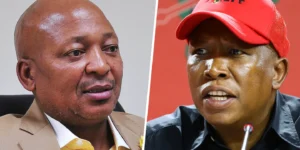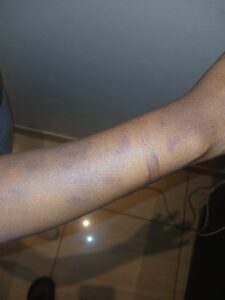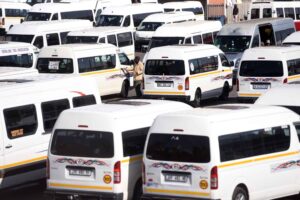By: Sipho Singiswa
Following the recent exposé about the theft of more than $4M from the South African president’s private game farm, Phala Phala, speculation is rife about how Cyril Ramaphosa came to be in possession of such a huge amount of foreign currency and why it was stashed in his couches.
Questions abound about his failure to declare it to the Reserve Bank, whether he intended paying related taxes, where the sources are from and what the intention was for such a huge stash of undeclared monies? Equally intriguing is the question of why Ramaphosa suspended Public Proctor, Busisiwe Mkwebane only a day after she had given notice of her intention to probe into this matter.
In an article released just more than a month ago I lamented the relentless legal battles waged against the South African Public Protector, Prosecutor and Ombudsman, Advocate Busisiwe Mkhwebane. I pointed out that the vicious vilification and character assassination of Mkhwebane can only be about undermining her valiant probes into Ramaphosa’s apparent abuse of power, state resources as well as the Executive Code of Ethics.
What other excuse would a president of a country have for acting contrary to the rule-of-law by waging such an unconstitutional war against the Public Protector?
The frequency of these attacks is seemingly politically motivated and orchestrated to prevent the discovery of damning evidence of money laundering, cross-border collusion and corruption.
Many believe that because this illegal activity directly implicates White corporate bosses who have close business links to Ramaphosa as well as corrupt members of the ANC’s inner circle, that they are also sponsors of the campaign to shut Mkwebane down. These masterminds include prominent public figures who are beneficiaries of Ramaphosa’s toxic generosity and abuse of power. Topping the list of beneficiaries are these corporate bosses followed by ideologically bereft corrupt ANC cabinet ministers and Thuma Mina aligned members of the judiciary, who enjoy the support of the false morality of certain neoliberal chapter 9 institutions.
Ramaphosa’s leadership is already synonymous with the corrosion of the ANC’s ideological values and a dwindling support base. His wilfull neglect of the 54th National Conference’s Key Resolutions has further impacted negatively on the ANCs reputation. What this points to, many speculate, is that Ramaphosa’s close links to the White corporate class makes them the first beneficiaries of economic policies and privileges. They say this provides proof that the big business sector is active in the execution of a calculated agenda to fast-track the decline of the ANC’s political influence and membership. This toxic relationship between Ramaphosa and big business is used as an effective weapon in demoralising and fracturing ANC structures, as well as in breaking down public trust and confidence in the ANC.
With this in mind it is clear that the Phala Phala debacle is not an isolated incident, but has its roots in a network of fiscal shenanigans that stretch back over decades. Reports of Ramaphosa’s possession of more than R1.24 billion in undeclared foreign currency in the #Farmgate scandal, follow years of allegations about his complicity in tax evasion, money laundering and racketeering. The exposé, coupled to the timing of his suspension of Mkhwebane from office on the eve of her starting an investigation of the undeclared money, is revealing about both Ramaphosa’s credibility and true agenda for the ANC’s future.
Some ANC members point out that while it may be shocking, it is not surprising that after Ramaphosa assumed the top dog position he immediately plotted, with the help of complicit members of the judiciary, to collapse the office of the ANC’s Secretary-General which insisted that the ANC’s 54th National Conference’s key resolutions must be honoured. Furthermore Ramaphosa, and his equally corrupt political cronies used the same period he claimed the ANC did not have funds to pay staff salaries as a smokescreen to advocate to disband MK structures, the ANC Women’s League and ANC Youth League structures.
They argue that all this happened in the period Ramaphosa is alleged to have had access to the estimated more than R1.24billion in undeclared US dollars concealed at his various private properties. They rightfully want Ramaphosa to explain to the ANC and the public the reasons for being in position of such money and the intentions thereof.
Some argue that contrary to his claim of commitment to the ANC’s agenda for renewal and unity, Ramaphosa is complicit in the corrosion of its liberation struggle ideology, ethics, umRabulo and structures. They argue that if he really cared for the renewal and unity of the ANC, and was concerned about not bringing further disrepute to the ANC and the country, Ramaphosa would do what is right and noble. He would respectfully step down as president in line with the ANC’s ‘Step-Aside-Rule’. He would do this to allow the pending investigations to unfold without fear or favor. Instead he refuses to do this and suspends the public protector.
They want Ramaphosa to allow the due processes of Mkhwebane’s investigation into his links to multinational companies to continue unhindered by his manipulation of the judiciary and parliamentary processes. The companies are being investigated by the Brazilian, US, UK, Dutch, Norwegian, Swiss and Venezuelan authorities on charges of paying bribes to secure improper advantages to obtain and retain business with state-owned and controlled entities in Africa.
However, ‘Mr Clean’ Ramaphosa has steadfastly shown no signs of any interest in observing anything that closely resembles the ANC own ‘Step-Aside-Rule’ to deal with corruption within its top leadership ranks. It is no wonder the word in the streets is that his nefarious corporate links have prevented him from fulfilling his obligations to the ANC and the majority and he has thus consistently brought disrepute to the ANC by abusing his positionality, influence and state resources to prioritise profits before the people. This has resulted in millions of job losses, the collapse of many insurance, retirement schemes and pension funds, as well as lack of social security nets for millions of South Africans.
On public and media platforms Ramaphosa has professed not to have anything to hide from the Public Protector. At the same time he has consistently used his financial power and influence to block Mkhwebane from launching a full investigation into his role in corporate collusion in international cross-border tax evasion schemes, racketeering and money laundering between multinational corporate giants and BEE companies linked to him and his political cronies. These same government officials are viewed by the corporate class as conduits to African markets and resources across the continent and, like Ramaphosa, enable this corruption to take place in full view whilst pretending it is legitimate.
Evidence and reports that are backed by, among others, both judgements against and admissions of guilt by multinationals giants directly linked to Ramaphosa, his political cronies and corporate sponsors points to decades of money laundering. It is also argued that a portion of the laundered money is used to pay bribes, buy political favours, and support elections. As much is suspected in regards to the dodgy funding of the CR17 and CR22 political campaigns.
Some argue that Ramaphosa has again manipulated legal processes to effectively put an end to the Public Protector’s investigation due to his fears about the resurrected public interest that is growing into support for Mkhwebane in her pursuing her probe of Ramaphosa . This after reports of the alleged more than a billion in undeclared foreign currency became public knowledge. The timing of her suspension on the eve of her starting an investigation of the alleged undeclared billions seems to support this theory.
Ramaphosa and his network of business and media beneficiaries, have been hard at work trying to spin doctor a yarn to convince the public to view the undeclared foreign currency saga as an isolated incident. It is of utmost importance to them to extricate it from the years of allegations about Ramaphosa’s role in cross-border money laundering and racketeering.
RAMAPHOSA’S CHEQUERED BUSINESS CAREER I BESET WITH ALLEGATIONS OF CRIMINAL ACTIVITY
In 2016 the South African Revenue Service identified more than 560 offshore companies and nearly 2 000 South African residents linked to money laundering, concealment of assets and setting up secret offshore accounts that were exposed by the Panama Papers. The Papers reveal how when Ramaphosa was both the Head of Government Business and BEE chairperson and executive of multitude of multinational companies such as Glencore, LONMIN and MTN major corporate bosses and politicians connived to siphon and launder trillions of Rands out of South Africa.
According to the May 24, 2022 US Department of Justice judgement “between 2007 and 2018, Glencore and its subsidiaries caused approximately $79.6 million in payments to be made to intermediary companies in order to secure improper advantages to obtain and retain business with state-owned and state-controlled entities in Africa. Evidence shows that when Ramaphosa was still Glencore’s BEE chairperson, the mining company concealed bribe payments by entering into sham consulting agreements, paying inflated invoices, and using intermediary companies to make corrupt payments to foreign officials”.
Evidence shows that during financial year (2017-2018) alone when Ramaphosa was Head of Government Business responsible for the government parastatals, the cash-strapped SOEs (Denel, Eskom, SAA, SABC, Telkom and Transnet) were compelled or directed to engage the services of overpaid assets and financial management, consultancy and audit firms with direct business links to Ramaphosa’s companies.
Some of the major firms who benefitted from Ramaphosa’s ‘way of doing things’ as the Head of Government Business, such as PwC, Deloitte, EY, Baines, KPMG’s, McKinsey and Trillian Capital, were also headlining major business transactions with the same transnational mining giants linked to Ramaphosa’s political campaign and paid nearly more than R3 billion for consultation and outsourcing work to manage the country’s national assets without any visible progress to speak of.
It is under Ramaphosa’s watch that in return for supporting a guaranteed corporate friendly Ramaphosa-led government these firms were allowed to invoice the state for inflated consultancy fees amounting to billions of Rands that are laundered and shipped out of the country. And not surprising, these firms often billed the SOEs for consultancy work and outsourced work that they contract to several smaller subsidiaries less known to the public, but are themselves companies controlled by the same major firms.
This backdrop to Ramaphosa’s allegedly ill-gotten riches most probably explains why Ramaphosa did not report the theft of such a significant portion of the estimated more than R60 millions and the push to suspend Mkhwebane. Among others, the exposé validates Mkhwebane’s investigation and report that found irrefutable evidence that Ramaphosa is involved in international tax evasion schemes, racketeering, money laundering, abuse of power and state resources to advance his political campaigns and self-enrichment.
In her 2019 report, Mkhwebane disclosed evidence of money laundering and that Ramaphosa had deliberately misled parliament and recommended that he be investigated by the Speaker and the National Prosecuting Authority (NPA).
She also requested to be granted permission to expand her investigation into an in-depth probe of the president’s links to the multinational companies. But the corrupted ANC inner circle conspired to have her application rejected by parliament.
However, in a very strange and unashamedly biased, judgement Justice Chris Jafta declared Mkhwebane “should not have even entertained the issue of money laundering in her investigation into the CR17 campaign”. And because of the mention of money laundering Jafta dismissed Mkhwebane’s report and application to investigate Ramaphosa’s involvement in corruption and election rigging. This is despite on-going legitimate investigations similar to Mkhwebane’s probe by the Brazilian, US, UK, Dutch, Norwegian, Swiss and Venezuelan authorities, as well as now validated by the May 24, 2022 US Department of Justice judgement
I have argued in previous writings that Given all the undeniable evidence contained in the Public Protector’s Report, and the reasons he gave for invalidating the report, Justice Jafta’s decision is nonsensical and simply disgraceful. It points more to a Justice and judgement that is less concerned about the irrefutable evidence and truth about Ramaphosa’s alleged criminal misconduct, but rather one that is more interested in serving and advancing Ramaphosa’s Thuma Mina campaign to undermine Mkhwebane’s legitimate investigation.
I believed then and still believe today that Justice Jafta’s judgement will never pass the scrutiny of any self-respecting international court of law.
I also believe that Cyril Ramaphosa has waged his ongoing war on Mkhwebane because he is afraid that she alone will expose his past and and his present and unravel his future as the number one African Capitalist – the blue-eyed-boy and protector of the white billionaire club he so admires.
*Sipho Singiswa is an ex-Robben Island political prisoner and a well-known documentary filmmaker and political commentator. He is a founder of Media for Justice and Head of media and international programming for Robben Island Ex Political Prisoner Human Rights Programme.








Ramaphosa is afraid of Busisiwe Mkhwebane because she is representing the public without fear or favor